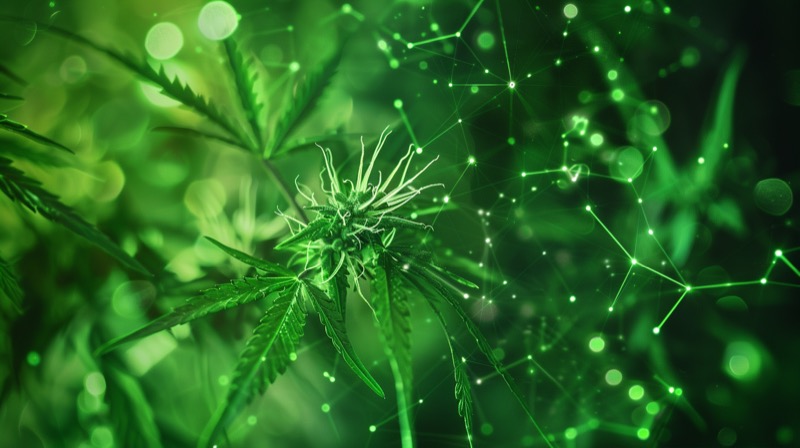When it comes to CBG research, cannabis and hemp have generally been considered taboo, but thanks to modern legalization, they are becoming more acceptable in society. Many people are learning more about the plant and the benefits it has to offer.
One thing many people don’t know is that both cannabis and hemp have hundreds of compounds, and each individual compound provides different effects. There are well-known compounds, like THC, which has psychoactive effects and wellness benefits, and CBD, which is beneficial to health and is not psychoactive. Then there are lesser-known compounds like CBN, CBC, and the mother of all cannabinoids, CBG (cannabigerol).
Read on to learn more about CBG effects, CBG research, and CBG studies.
What is CBG?

People may wonder, what is CBG? It may be a lesser-known cannabinoid, but it is often called the “Mother of All Cannabinoids”. It earned this nickname because its acidic form, CBGA, is the cannabinoid from which all other cannabinoids are derived.
However, because it is often transformed into other cannabinoids, it is only found in the cannabis plant in small quantities. Its rare status makes it an expensive wellness supplement.
Plants with high concentrations of THC and CBD have lower concentrations of CBG. Most of the CBG content in these plants has already been converted to other compounds. However, strains with lower THC and CBD concentrations have more CBG.
CBG’s rarity has caused many growers to experiment with cross-breeding and genetic mutation to make the compound more readily available.
Is CBG Psychoactive?
No, CBG is not psychoactive. It does not cause changes in moods, thoughts, or behavior. It produces benefits without any mind-altering effects.
Effects of CBG in the Body
Cannabigerol (CBG) is used by your body primarily through how it connects with your endocannabinoid system (ECS). Your ECS plays a crucial role in regulating a wide array of bodily functions, from mood to appetite to inflammation and several other critical processes.
What is the Endocannabinoid System (ECS)?
The Endocannabinoid System (ECS) is a complex cell-signaling system identified in the early 1990s by researchers exploring THC, a well-known cannabinoid. The ECS is active in your body even if you don’t use cannabis products. It’s involved in regulating a range of functions and processes, including sleep, mood, appetite, memory, reproduction, and fertility.
The ECS is made of three core components: endocannabinoids, receptors, and enzymes.
Endocannabinoids are molecules made by your body, similar to cannabinoids, but are produced within your body. These endocannabinoids bind to receptors located throughout the body to signal the ECS to take action. There are two main endocannabinoid receptors: CB1 receptors, mostly found in the central nervous system, and CB2 receptors, primarily found in your peripheral nervous system.
Enzymes are responsible for breaking down endocannabinoids once they’ve carried out their function. This finely-tuned system helps maintain homeostasis, a stable internal environment within your body, despite changes in the environment outside your body.
CBG imitates endocannabinoids and binds with receptors to produce various CBG benefits.
How CBG Affects the Endocannabinoid System
CBG interacts with the ECS in a way that is different from other cannabinoids like THC and CBD.
Unlike THC, which wants to bind with CB1 receptors in your brain, leading to psychoactive effects, CBG does not induce such effects. Instead, CBG connects primarily with CB2 receptors, which are more prevalent in your body’s immune system.
By binding to these receptors, CBG can influence your ECS to regulate inflammation, pain, and even mood. Early research suggests that CBG may help in reducing inflammation, pain, and possibly treating the effects of conditions like IBD (Inflammatory Bowel Disease). Additionally, CBG might play a role in influencing the overall balance of the ECS, potentially enhancing its health and your body’s response to various physiological challenges.
The way CBG interacts with the ECS is also significant because it influences the levels and activities of endocannabinoids. By improving your ECS, CBG may help correct imbalances in your bodily systems, which helps improve your overall health. However, more research is needed to fully understand the extent and mechanisms of these interactions.
What is CBG Good For?
CBG studies have been conducted to establish the effects of CBG. It provides the following benefits:
Reduces Anxiety and Depression
According to CBG research, most people use the compound to reduce anxiety. One in three individuals who use CBG to improve anxiety also find that it relieves depression. Most study participants reported it was more effective in treating these mental health issues than conventional medication.
Relieves Chronic Pain
CBG oil benefits include its ability to relieve chronic pain. Chronic pain is defined as any pain that lasts three months or more. 73.9% of study participants said it worked better than most pain-relieving prescription medications.
Reduces Inflammatory Bowel Disease (IBD) Symptoms
CBG cannabis binds with CB2 receptors to reduce inflammation in the digestive tract. This characteristic makes it a promising treatment for IBD, a chronic inflammatory condition that affects the gut. CBG research shows that 15% to 40% of people with IBD use CBG to reduce pain and increase appetite. More research is needed to establish if it’s truly effective.
Relieves IOP in Glaucoma Patients
Cannabis has long been viewed as an effective glaucoma symptom reliever. CBG is especially effective in reducing interocular pressure (IOP). Ongoing CBG studies will help determine if it’s an effective glaucoma treatment.
Skin Health Boosting Properties
CBG’s anti-inflammatory properties make it an effective skin health-boosting remedy. Studies reveal its ability to reduce acne-associated redness and inflammation. Its antioxidant properties also protect the skin from oxidative stress.
Neuroprotective Properties
Research shows that CBG CBD combine to offer neuroprotective benefits. They are responsible for cytokine release which inhibits the inflammatory response. CBG also acts as a receptor agonist to aid with neurotransmitter activity. It could slow down neurodegeneration associated with Huntington’s Disease and other cognitive issues.
Antibacterial Characteristics
CBG’s antibacterial properties could make it an effective treatment for staphylococcus aureus, a drug-resistant bacteria that causes staph infections.
Reduces Nausea
CBG studies suggest that the compound could reduce nausea when used with CBD and on its own. It has the potential to help decrease nausea in people undergoing chemotherapy, so they regain their appetite and improve their quality of life.
CBG Side Effects: Understanding the Full Picture

CBG is generally considered safe, but like any substance, it can have somew side effects. Some of the most commonly reported side effects include dry eyes, increased appetite, dry mouth, and drowsiness.
While these effects might be inconvenient, it’s important to also consider the positive impacts CBG can have on health:
- Pain Relief: One of the most important benefits of CBG is its ability to help relieve pain. This can be particularly helpfful for those suffering from chronic pain conditions. By interacting with your body’s endocannabinoid system, CBG can help reduce the sensation of pain, offering a natural alternative to traditional pain medications.
- Relaxation and Stress Reduction: CBG has been seen to promote relaxation and reduce stress. This can be especially beneficial for individuals dealing with anxiety disorders or high levels of daily stress.
- Anti-Inflammatory Properties: CBG’s potential anti-inflammatory properties are another area of interest for CBG Research. This can be particularly relevant for conditions like inflammatory bowel disease or arthritis, where inflammation plays a key role. By reducing inflammation, CBG may help alleviate symptoms associated with these conditions.
- Neuroprotective (Brain) Effects: Emerging research suggests that CBG might have neuroprotective properties. This could be significant in managing neurodegenerative diseases such as Huntington’s disease or protecting against age-related cognitive decline.
- Antibacterial Properties: CBG has shown potential as an antibacterial agent, particularly against strains of bacteria that are resistant to traditional antibiotics. This opens up possibilities for CBG in treating infections that are challenging to address with current medication.
In summary, while CBG can have some side effects, its potential benefits in pain relief, relaxation, anti-inflammatory action, neuroprotection, and antibacterial properties make it a of significant interest in wellness and medical communities.
CBG Effects: How to Use It

Now we can answer questions like, “CBG what is it?”, and “What does CBG help with?” But how do you use CBG?
CBG is rarely available on its own. Rather, you might find it combined with other cannabinoids. For example, you may find products that contain THC CBG or CBG CBD.
You may find CBG in products like oils, capsules, edibles, tinctures, topicals, and patches. You may even smoke flower with a high CBG concentration. If you purchase cannabis at a dispensary, the label should provide information on the compounds the product contains.
CBG and the Entourage Effect
While some people prefer CBG isolate effects, the combination of CBG and other cannabinoids makes it even more potent. This phenomenon is due to something called the entourage effect. The entourage effect is based on the theory that combined compounds, including cannabinoids and terpenes, can enhance the effects of each component.
You can get an entourage effect from full-spectrum extracts, which may contain trace amounts of THC, or broad-spectrum extracts, which are THC-free. However, some people prefer isolates because they trust them to be free of contaminants and unwanted ingredients.
CBG Research Summary
CBG is not the most well-known cannabis compound, but it is the compound from which many other cannabis compounds are derived. The non-psychoactive cannabis constituent transforms into other compounds, so it is rare and therefore expensive. However, people who can access it can enjoy CBG effects like reduced pain and inflammation and elevated mood.
Although CBG is rarely available on its own, you can find several CBG and CBD and CBG and THC products on the market. Now think, how could you benefit from adding CBG Oil to your daily routine?





